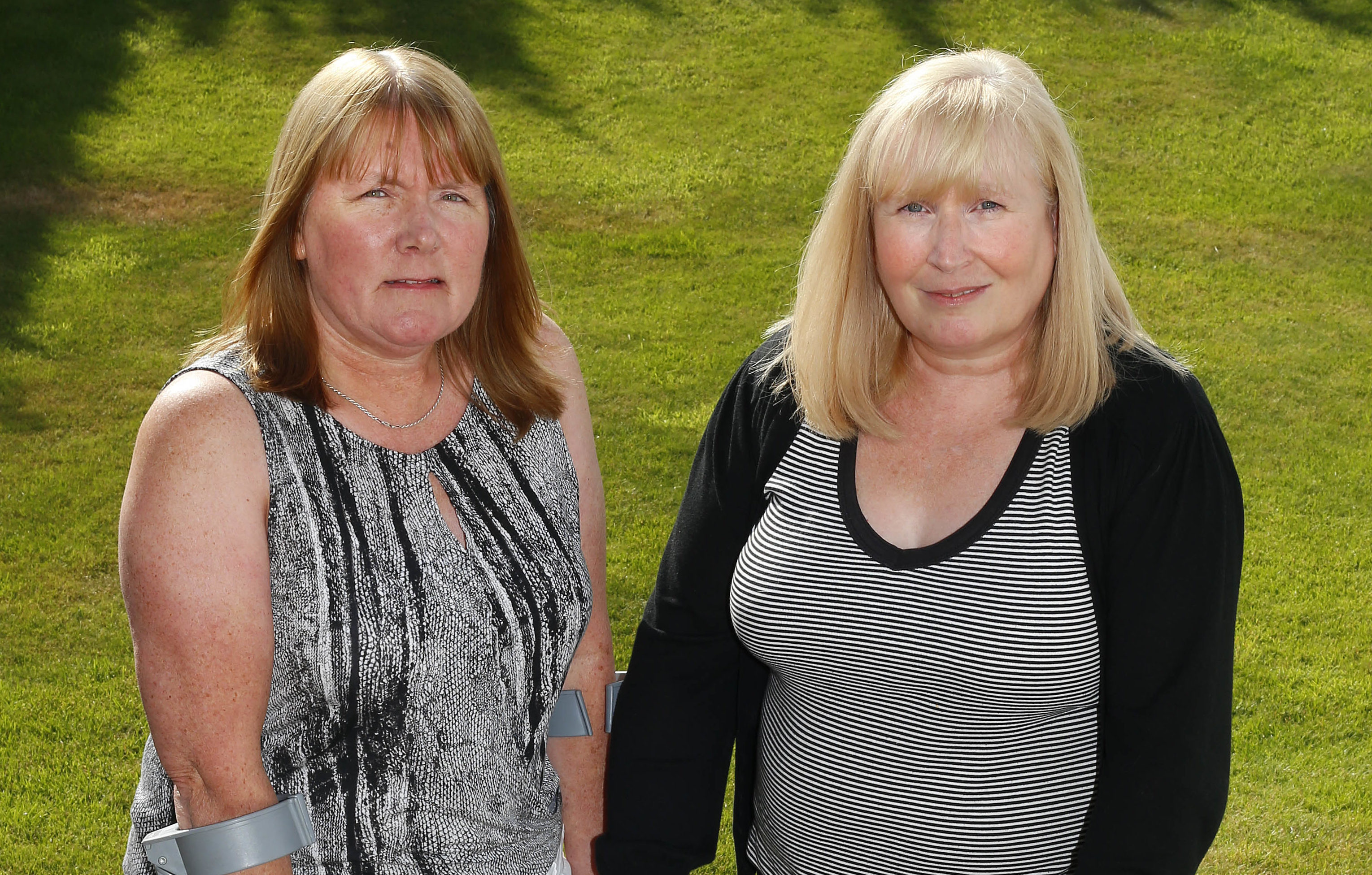
CAMPAIGNING mesh victims will take legal action to force the Government to remove their names from a “whitewash” report into the surgery blamed for leaving hundreds of Scots in agony.
The women are furious that ministers have used their names and research in the review despite their resignation from the inquiry.
Elaine Holmes and Olive McIlroy met Health Secretary Shona Robison before the review was published to demand their names come off the report after they lost faith with the review process.
They are now promising to take action after the report, which they claim was skewed in favour of mesh, and ignored evidence revealing the risks involved, was published unchanged.
The women’s exposure of the plight of victims left with life-changing, lifelong injuries because of mesh treatment led to former health secretary Alex Neil ordering suspension of its use in Scotland.
However, the official review was used to justify lifting the ban just as other countries around the world began to suspend and curtail the use of mesh. Elaine Holmes said: “Shona Robison was left under no illusion how we felt about the whitewash of a review which betrayed injured women and set up future generations to have their lives destroyed by mesh.
“We told her all our input must be removed in advance of the report being published. She assured us, in front of witnesses, that she’d heard us.
“Imagine our disgust when we discovered our names and input continued to be used to give that sham report credibility?”
Neil Findlay: For once, Shona Robison should do the right thing… She should go
The women, who campaigned for seven years to alert the world to the dangers of plastic polypropylene mesh implants to treat bladder problems and pelvic organ prolapse, have advised other governments on safety.
They say the inclusion of their names is “yet another slap in the face”.
The women resigned from the review, along with leading urogynaecologist Wael Agur, claiming vital safety evidence and warnings from around the world had been excluded, data had been altered and European guidance that all mesh should be reclassified as “high risk” was not properly acknowledged.
The women met Robison in March last year along with Chief Medical Officer Catherine Calderwood and MSPs.
They raised concerns over experts with conflicts of interest, and what they describe as a “misleading chapter’ which concludes mesh procedures are better than non-mesh- while withholding mesh complications. They also claim the report describes specific disadvantages of non-mesh procedures but not any advantages, encouraging patients towards implant surgery.
Campaigners say one type of implant, inserted “blind” using 10-inch long metal hooks causing nerve damage to 40% of patients, was wrongly described as “removable”.
Each of the four experts appointed to the review had previously received funding from mesh manufacturers, but were asked for declaration of interests going back only a year.
Consultant Paul Hilton, an independent medical witness for the NHS in the forthcoming 500 civil actions for damages by mesh patients, was not asked to disclose previous mesh industry funding.
The review failed to detail another review expert, NHS Glasgow’s lead urogynaecologist Karen Guerrero, was organising training programmes for gynaecologists sponsored and subsidised by Boston Scientific which denies allegations it used counterfeit polypropylene resin from China to manufacture implants.
Another expert, NHS Lothian consultant Voula Granitsiotis, received travel grants from mesh firms, including American Medical Systems which collapsed after announcing a £1.2 billion pay-outs.
Both NHS Glasgow and NHS Lothian, ignored Scotland’s 2014 mesh suspension and continued to implant hundreds more women.
The fourth expert, NHS Ayrshire and Arran specialist Dr Wael Agur received travel grants and support from Boston Scientific, Ethicon and CR Bard. Although he declared these, the declaration was not published.
Professor Cathryn Glazener, researcher to the inquiry, was involved in a number of multi-million pound mesh trials. Isobel Montgomery, the patient who had a “positive mesh experience”, received almost £3000 in mesh trial fees and was listed as a “grant holder”. Her declaration of interest failed to list this.
Olive McIlroy said: “We were cynically used to ‘sell’ a report biased towards mesh despite evidence that showed how dangerous it is.”
The report only recommended against “routinely” using mesh for pelvic problems, leaving the door open. It also recommended a mesh tape could be offered for bladder conditions when traditional methods that didn’t have the same devastating complications should be considered first.
Olive added: “Our own country, which under previous Health Secretary Alex Neil led the world by suspending the use of mesh, went on to ignore the hundreds of thousands worldwide who have been injured, and the £3billion paid out by manufacturers.”
The women are taking legal advice and are drawing up a legal disclaimer.
A Scottish Government spokesman said: “Both the Health Secretary and the Chief Medical Officer have great sympathy with the complications that these and other women have suffered following surgery and have personally and publically apologised to them.”
Leading civil law specialist Patrick McGuire of Thompsons Solicitors is examining the case. He said: “The women rightly feel they have been betrayed and their names used to bolster the credibility of this report, despite the fact that they disagree with so much of it and the way the review was carried out.
“We intend robustly pursuing whatever avenue is open to us.”

Enjoy the convenience of having The Sunday Post delivered as a digital ePaper straight to your smartphone, tablet or computer.
Subscribe for only £5.49 a month and enjoy all the benefits of the printed paper as a digital replica.
Subscribe